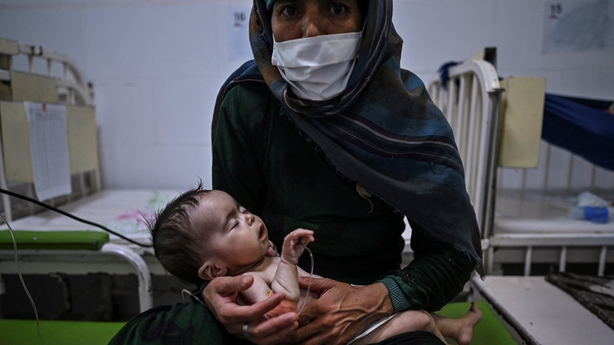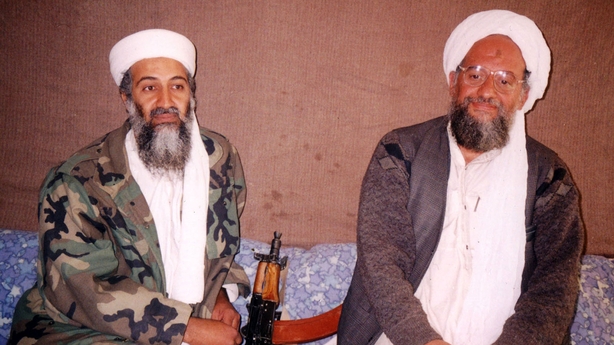It was meant to be scheduled, organised and orderly. In the end it was anything but.
The withdrawal of US and Western forces from Afghanistan last summer after 20 years in the country, produced scenes which drew parallels with the fall of Saigon, as troops, diplomats and Afghans who had helped Western forces looked to leave within days.
From the moment US President Joe Biden announced in April that all US troops would be gone from Afghanistan by the end of August, there were warnings about the message it would send to a potentially resurgent Taliban.
But President Biden was adamant that there was no option other than to leave Afghanistan, arguing that too many American lives had already been lost in the US's longest war, and to sacrifice more was untenable.
And so it came to pass. As the Taliban saw the vacuum that would open up with a US retreat it stepped back in, taking back region after region it had lost two decades earlier.
By 15 August last year, the Taliban was in the capital Kabul even as international troops and citizens were still trying to leave.
One year on, what are the biggest issues facing Afghanistan?
Humanitarian
The dire economic situation has had a devastating impact on poverty levels in the country, with the United Nations recently reporting that some 24.4 million people or 59% of the population have needed humanitarian assistance so far in 2022, up from 18.4 million at the start of 2021
It was no surprise that the UN warned of the "unprecedented levels of need" among the Afghan population.
Some 19.7 million people, almost half the entire population, are considered at risk of acute food hunger while some 6.6 million Afghans face an emergency level of food insecurity.

Amid those bleak figures there is an element of good news. Dire warnings about a possible large-scale famine in the country this year have not come to pass.
The calamitous combination of decades of war, the withdrawal of a large amount of international aid when Western troops left last year, as well as recurrent severe drought conditions had led many aid agencies to believe that famine was inevitable this year.
But already there are fears that it has only been delayed, not solved, with every expectation that warnings of impending famine will surface again in the coming months.
The UN estimates that this winter could see what was feared last year, with millions already on the cusp of starvation, and the situation exacerbated further by a global food crisis which is set to hit the most vulnerable first.
Economic
The Afghan economy was heavily dependent on foreign aid, a huge portion of which was withdrawn when the Taliban regained control.
Graeme Smith is a senior consultant for the International Crisis Group's Asia programme, focusing on Afghanistan.
He points out that a large part of the Afghan economy was based on war, and the removal of external international funding, as well as the sanctions imposed on the Afghan economy, has had a significant effect on the country’s macroeconomic stability.
We need your consent to load this rte-player contentWe use rte-player to manage extra content that can set cookies on your device and collect data about your activity. Please review their details and accept them to load the content.Manage Preferences
But Smith also points to the issuing of something called a General Licence 20 issued by the US Treasury Department in February as an indication that Washington knows it must engage with the current situation in Afghanistan.
"The GL aims to ensure that US sanctions do not prevent or inhibit transactions and activities needed to provide aid to and support the basic human needs of the people of Afghanistan" - US Treasury Department
The licence is the "largest exemption to US sanctions in US history" and can be seen, Smith says, as an acknowledgement that the US has to do something to try and ease the humanitarian situation in Afghanistan.
General Licence 20 does this by authorising certain transactions involving governing institutions in Afghanistan and the Afghanistan Central Bank.

While there are some restrictions, the GL20 provides a lot more clarity for international organisations and allows for more transactions and activities to support the Afghan people, at a time when those supports are vitally needed.
Recently returned from a visit to Kabul, Graeme Smith talks of the quiet he observed in many parts of the city as he notes that the level of daily violence has reduced.
But there are other new sights also, among them the desperation of "crowds begging for food at bakeries...which is not something you would see on the streets of the capital previously."
Security
GL20 also reflects concerns over the security situation in Afghanistan though, as the US and its partners who withdrew a year ago assess the defence concerns in the country.
The recent death of al-Qaeda leader Ayman al-Zawahiri by a US drone missile attack in the centre of Kabul put the issue of security front and centre once again.

While President Biden talked of how it showed the US could still hit the targets it wanted without having soldiers on the ground in Afghanistan, was a reminder of the connections between the Taliban and al-Qaeda.
Bill Roggio, Editor of The Long War Journal and Senior Fellow at The Foundation for the Defense of Democracies, says the death of al-Zawahiri has given President Biden's administration the opportunity to change the narrative around Afghanistan from one of US failure to one of US success, but it is still only part of the story.
It shows that the real issue is how al-Qaeda is able to operate in the open in Afghanistan now, and how close the relationship between it and the Taliban remains, says Roggio.
We need your consent to load this rte-player contentWe use rte-player to manage extra content that can set cookies on your device and collect data about your activity. Please review their details and accept them to load the content.Manage Preferences
As the international community struggles with how to engage with the Taliban, Roggio says the organisation has cemented its power and faces only small pockets of resistance from the Northern Alliance.
That alliance is "poorly funded, poorly armed and doesn't have a real state sponsor", he says, further damaging any prospect of it challenging a Taliban which controls all 34 provinces and has access to the weaponry left behind by US troops.
Roggio also says a call from the US State Department saying it doesn't support armed resistance to the Taliban, and believes resistance groups should negotiate with the Taliban, is "the kiss of death for a national resistance front" in terms of any potential US backing.
A year on from the withdrawal of US troops and their allies, Afghanistan faces myriad challenges. From poverty, to women's rights, to ongoing security concerns, a country with an already tumultuous history has had yet another tumultuous year, with no end to that tumult in sight.




